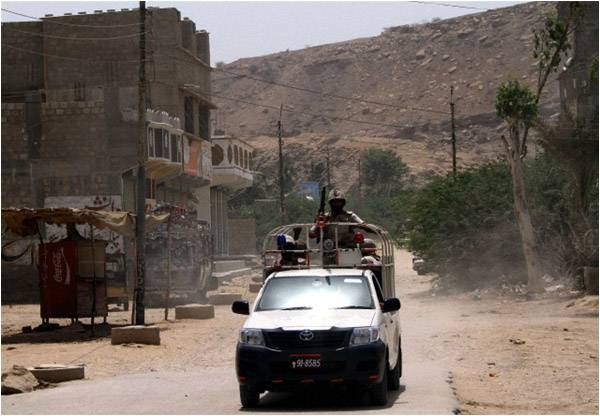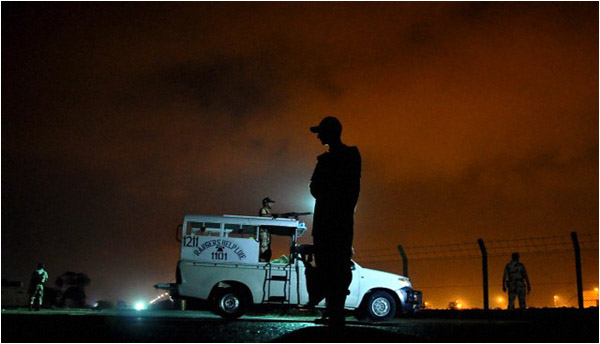
Law enforcement agencies have intensified operations against various Taliban groups in Karachi, in response to the December 16 killing of over 140 children at an army-run school in Peshawar.
Rangers and police have killed a number of TTP militants, including Abid Mehsud, alias Mucharh – an operational commander of the Mehsud faction of TTP led by Khan Said alias Sajna – in an encounter with Rangers on December 18.
The Mehsud faction broke away from the TTP – which claimed the Peshawar attack – in late May, and was carrying out peace talks with the government through an 11-member jirga of Mehsud tribal elders, one of whom said they had agreed not to carry out subversive activities inside Pakistan and focus on Afghanistan.
But on December 21, Azam Tariq, the spokesman of the faction, endorsed the Peshawar school attack and said it was a reaction to the killing of children in military operations and drone attacks.
The same day, the police’s criminal investigation department (CID) killed two militants of the Sajna faction. On December 22, police and rangers killed nine militants belonging to the TTP and four operatives of Al Qaeda in the Deluxe Town locality of Sohrab Goth.
“Mucharh was the most dangerous commander of the TTP,” said an officer in Manghopir police station. “He was involved in attacks on the Rangers and police and workers of the Awami National Party,” he said, “and was collecting extortion money from Pashtun traders.”
He said Mucharh’s killing “was a big blow to the TTP in Karachi and a great achievement for law enforcement agencies”.
Mehsud tribal elders in Karachi and Tank say the recent killings have disrupted the peace talks. Background interviews with the Pashtun elders, analysts and police officials familiar with the network of the TTP in Karachi reveal that most of the Pashtun-majority areas of the city are under the TTP’s influence. Law and order conditions in these neighbourhoods have worsened in the last two years, as the TTP joined hands with local operatives of banned sectarian outfits and criminal syndicates. They have become “no-go areas” for law enforcement agencies, liberal political activists especially those belonging to the ANP, polio vaccinators and nongovernmental organizations.
The recent operations seem to be part of a genuine crackdown against Taliban groups in the city, according to them.

“The situation has changed completely after the Peshawar attack, it seems,” said a tribal journalist who covers militancy in North and South Waziristan region. “The military has been targeting all Taliban groups, whether they were involved in peace talks or not.” He said that the Sajna faction might rejoin the TTP alliance.
Police officers in Karachi said that the city and its law-enforcement officials might become targets of revenge attacks after the recent executions of militants and the intensification of the operation against Taliban.
“Our officers have been receiving threatening phone calls from Afghan Taliban leaders,” said a CID officer. He said law enforcement agencies have increased security of the offices of military and police, vital installations such as the airport, shipping ports and oil terminals, political leaders, foreign diplomatic missions, and civil society organisations.
The writer is a journalist who covered security issues in Pakistan.
Twitter: @zalmayzia
Rangers and police have killed a number of TTP militants, including Abid Mehsud, alias Mucharh – an operational commander of the Mehsud faction of TTP led by Khan Said alias Sajna – in an encounter with Rangers on December 18.
The Mehsud faction broke away from the TTP – which claimed the Peshawar attack – in late May, and was carrying out peace talks with the government through an 11-member jirga of Mehsud tribal elders, one of whom said they had agreed not to carry out subversive activities inside Pakistan and focus on Afghanistan.
But on December 21, Azam Tariq, the spokesman of the faction, endorsed the Peshawar school attack and said it was a reaction to the killing of children in military operations and drone attacks.
The same day, the police’s criminal investigation department (CID) killed two militants of the Sajna faction. On December 22, police and rangers killed nine militants belonging to the TTP and four operatives of Al Qaeda in the Deluxe Town locality of Sohrab Goth.
“Mucharh was the most dangerous commander of the TTP,” said an officer in Manghopir police station. “He was involved in attacks on the Rangers and police and workers of the Awami National Party,” he said, “and was collecting extortion money from Pashtun traders.”
He said Mucharh’s killing “was a big blow to the TTP in Karachi and a great achievement for law enforcement agencies”.
The city and its law-enforcement officials fear revenge attacks
Mehsud tribal elders in Karachi and Tank say the recent killings have disrupted the peace talks. Background interviews with the Pashtun elders, analysts and police officials familiar with the network of the TTP in Karachi reveal that most of the Pashtun-majority areas of the city are under the TTP’s influence. Law and order conditions in these neighbourhoods have worsened in the last two years, as the TTP joined hands with local operatives of banned sectarian outfits and criminal syndicates. They have become “no-go areas” for law enforcement agencies, liberal political activists especially those belonging to the ANP, polio vaccinators and nongovernmental organizations.
The recent operations seem to be part of a genuine crackdown against Taliban groups in the city, according to them.

“The situation has changed completely after the Peshawar attack, it seems,” said a tribal journalist who covers militancy in North and South Waziristan region. “The military has been targeting all Taliban groups, whether they were involved in peace talks or not.” He said that the Sajna faction might rejoin the TTP alliance.
Police officers in Karachi said that the city and its law-enforcement officials might become targets of revenge attacks after the recent executions of militants and the intensification of the operation against Taliban.
“Our officers have been receiving threatening phone calls from Afghan Taliban leaders,” said a CID officer. He said law enforcement agencies have increased security of the offices of military and police, vital installations such as the airport, shipping ports and oil terminals, political leaders, foreign diplomatic missions, and civil society organisations.
The writer is a journalist who covered security issues in Pakistan.
Twitter: @zalmayzia

